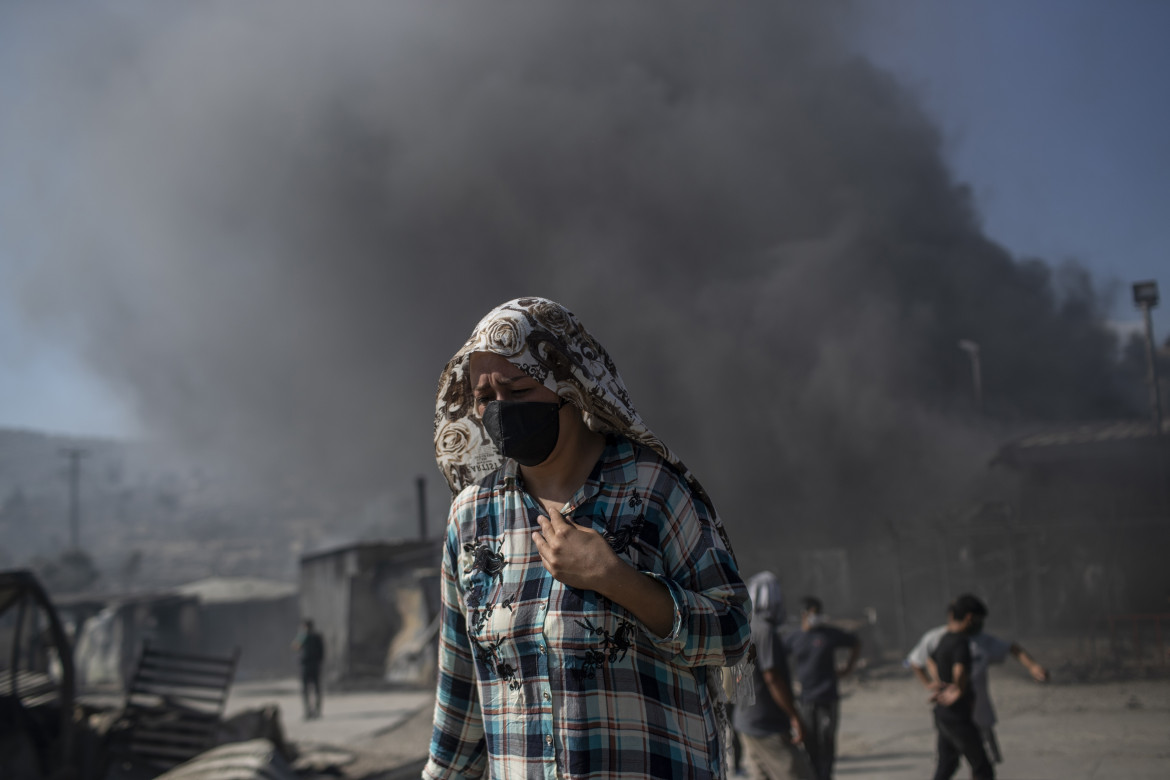Reportage
On Lesbos, fire displaced thousands from their barracks
At least 6,000 people have been left without even the miserable shelter they could count on until Tuesday, while a few thousand migrants managed to escape despite the cordon of riot police immediately deployed around the camp by the right-wing government.

“I heard the cry of the desperate,” said Armin Laschet, a candidate for the presidency of the CDU, the party of German Chancellor Angela Merkel, after returning from a trip to the camp of Moria on the Greek island of Lesvos.
On the night between Tuesday and Wednesday, that cry came to life in the form of a fire that devastated the largest refugee camp in Europe. The firefighters fought for a long time to put out the flames, and in the end what presented itself before everyone’s eyes was a scene of total destruction.
Fortunately, there were no victims or injured, but everything else ended up in ashes. The tents and the shacks inside which people were barely managing to survive were burned down. According to data updated as of September 7 by the Greek government, 12,767 asylum seekers lived at the camp (while the maximum capacity of the camp is 2,967). The Registration and Identification Center of the UNHCR, the UN agency for refugees, burned down as well. Likewise, the facility outside the camp managed by an international NGO which was used for the quarantine of the 35 people who tested positive for COVID was burned to ashes.
“The paradox is that the hospital container donated by the Dutch government was also destroyed, and was never used” says Andrea Contenta, in charge of human rights issues for Doctors Without Borders in Greece.
The result is that at least 6,000 people have been left without even the miserable shelter they could count on until Tuesday, while a few thousand migrants managed to escape despite the cordon of riot police immediately deployed around the camp by the right-wing government led by Kyriakos Mitsotakis.
Immigration Minister Notis Mitarachi alleged that the fires “began with the asylum seekers because of the quarantine imposed” to contain the COVID emergency, although there is no clear evidence of the migrants’ responsibility. “The combination of migration and the pandemic in these conditions is creating an exceptionally challenging situation,” admitted Mitarachi.
For now, we can be certain of only two things: the first is that the fire broke out in at least three different points at the camp, as established by the firefighters, who also recounted that they encountered resistance from some migrants in their efforts to put out the flames. The second is that behind the events that occurred lies the exasperation of thousands of men, women and children abandoned by Athens. “They had been asking the government for some time for a comprehensive plan to deal with the COVID emergency, but the plan was never made, and these are the results,” Contenta adds.
Since the pandemic arrived in Greece, the approximately 70,000 asylum seekers in the country are among those who have paid the highest price—not in terms of the number of infections, but in terms of the continuing restrictions on their freedom of movement. And the 27,000 who are on the Aegean islands have paid the highest price of all. The lockdown, which began on March 21, was extended for the refugees—first until May 11, then until May 21, then later extended until June 7, and again until July 19, after which yet another deadline was set for September 15.
All this was accompanied by increasingly stringent measures: “As of today, the movement of island camp residents will be drastically reduced,” Mitarachi announced back in March. For the migrants, this has meant they are only allowed to leave the camps “in small groups” between 7 a.m. and 7 p.m. and with only one person per family present in a particular group. In addition, movements using public transport are supervised by the police. “Whenever possible,” orders for food and other essential items are supposed to be made by telephone.
These restrictions are compounding a situation of overcrowding that is already harrowing, especially in Moria, where almost 13,000 people have access to water for only 5-6 hours a day, where there are 160 people per toilet and 500 people per shower.
“Instead of investing in proper pandemic prevention, Greek authorities are focusing on discriminatory COVID-19 confinement rules that are much stricter for people seeking asylum than for everyone else in Greece. These measures facilitate Greek plans to turn refugee camps into … de-facto detention camps,” GCR and Oxfam denounced a few days ago. According to Doctors Without Borders, “the restriction of movement imposed on asylum seekers dramatically reduces their already-limited access to basic services and medical care … [It] is discriminatory towards people that don’t represent a risk and contributes to their stigmatization, while putting them further at risk.”
On Wednesday evening, Interior Minister Takis Theodorikaks announced that 3,500 refugees who have been left without shelter will be transferred on board a ferry and two military ships, while another 3,500 will be transferred to areas not affected by the flames or to centers identified by the government. 400 unaccompanied minors will be transferred to the mainland.
Originally published at https://ilmanifesto.it/lesbo-in-fiamme-il-campo-profughi-migliaia-di-sfollati/ on 2020-09-10
